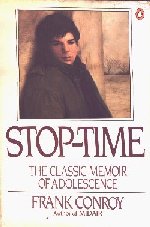


STOP-TIME
The Classic Memoir Of Adolescence
by Frank Conroy
first published 1967.I've read a lot of books- more than average, I think- not only because I like reading, but also because my job used to require that I read widely, even if not always well. There is an inevitable Ho-Hum effect when quantity outweighs quality as the basis for reading consumption, but a few works stay in the mind, refusing to be speed-read or scanned, clamouring for due attention and recognition. 'Stop-Time', written in 1967, is just such a book- the kind of book you find youself slowing over, deliberately postponing its all-too-near conclusion.

My own copy was sent in a box of mixed material to be reviewed for `Idiom', the magazine of an Australian he English Teachers Association,in 1987. The biography was, then, already twenty years old, yet I can remember being astonished by the newness of the described experiences, the total relevence I sensed to the existences of the adolescents with whom I was working.
Needing confirmation of such a strong reaction to this 'classic memoir of adolescence', a time of life I had left far behind and may, indeed, have forgotten, I discarded the book within reach of my nineteen-yearold son, the bibliokleptic one. Three weeks later, the surgical procedure required to retrieve it from his predominantly female University household was worthy of the Mayo Clinic... proof, too, for me, that my first impressions had been valid. When noone wanted to give the book back, I knew it had passed its ultimate test.

And the book continues to entertain, involving the reader to the extent that pages and sections need to be reread for more and more satisfaction, yielding, each time, greater insight and additional enjoyment. There is variety in this book- an incredible range of entrapped experiences that alternately horrify, amuse and educate. And often, so often, there is that flash of recognition- the familiar 'I have been there, too' sensation, as we identify with the author, which signals really great writing.

'The classic memoir of adolescence' , this book has been subtitled, and what a growing-up Frank Conroy is able to relive for us. Through a variety of schools, beginning with the ultimate in progressive education, (check out how the school solved the smoking problem!) detouring slightly via a training school for the intellectually handicapped, where his mother and stepfather were employed, into a state-managed high school and on to an International School in Denmark, the author makes his way from uneasy childhood through the agonizing process of sexual and emotional maturing, to his first day at Haverford College, at which point the odyssey ends abruptly. Too abruptly, I decided,for his adventures stayed long in my mind, and I found myself wanting to know more of his life. Could a sequel be arranged, I wondered then?
Well, it couldn't apparently. Though I pestered book suppliers for years, his next, `Midair', finally arriving from America, turned out, disappointingly, to be a book of skillfully drawn short stories, great reading, in the New Yorker style, but NOT the sequel I had so eagerly anticipated . I wondered, perhaps, if, like some returned World War 2 Airmen I know, his adolescence, like their war service, had been the peak of experience from which everything else had descended...that he had nothing else to say to us!
But not so! There is another book and I'm reading it now, with so much pleasure. that I find myself, at times, quite moist-eyed, and I am reading so slowly, because I NEVER want to finish it...the writing is so very GOOD....not just skillful, you understand....but the old Australian `BLOODY GOOD!!', which is about as high a tribute as a native Oz reader can bestow!

So that will be my next review, of course, but having the new book, (which I MUST buy; this is a library copy), made me go back to look at Stop-Time' again. Ten years down the track, it is ALMOST as good as I remember it, but now that I've met the author again, with thirty years honing his trade behind him, I can see the patchy writing in places in this first attempt, the slight lack of cohesion between chapters...the polish that his writing shows now not having been achieved, quite, in 1967. Yet it could be that it is this very this lack of sophisticated technique which gives this biography its strength, its veracity. It is, somehow, slightly AWKWARD.......and isn't that what adolescence is all about?
This book, in a later edition, is still in print, a 1993 reissue, and Amazon have an inexpensive paperback version. In my opinion Frank's story is as vital and valid today as it was in 1967, and well worth reading!
But keep it away from your teenagers.....or your copy will be as defaced, dogeared and discoloured as mine.


Want to check out Stop-Time's price and availability?
 |


 Reactions, Comments and suggestions to: robink@mail.austasia.net
Reactions, Comments and suggestions to: robink@mail.austasia.net